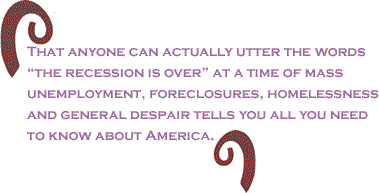Well,
it appears that some of the nation’s leading economists
have proclaimed that the recession is over. Of course, these were the best and brightest who failed to warn us
of the Great Recession in the first place, but I don’t want
to sidetrack you with trivialities.
So, let us pop open a bottle of champagne and celebrate.
I suppose that if you are one of those billion-dollar hedge
fund managers, this piece of information could actually
mean something to you. However, if you are one of those
struggling souls in that Dickens novel known as twenty-first
century America, it means little or nothing to you.

That anyone can actually utter the words “the recession
is over” at a time of mass unemployment, foreclosures, homelessness
and general despair tells you all you need to know about
America. The nation actually exists as two nations: the
few that have, and the many who don’t. The former group
does not depend on the well-being of the latter in order
to thrive, and arguably thrives on its misfortunes. Ultimately,
the American Dream is exactly that—a dream. And as millions
of people are waking up to stark realities, they long to
resume their slumber.
Currently, as the Census Bureau reported, 43.6 million people, or 14.3 percent of the U.S. population live in poverty. For people of color
it is even worse. While 9.4 percent of whites are in poverty,
25.3 percent of Latinos and 25.8 percent of blacks are poor.
And childhood poverty has risen to an alarming 20.7 percent.
To be sure, it hasn’t been this bad since the 1960s. Some
people say that all we need to do to alleviate poverty is
to grow the economy. But what good will creating a larger
pie do for us, with the top 1 percent still taking the lion’s
share of the pie?
Establishment conservatives are so transparent in their
greed that their only solution is to keep the Bush tax cuts
for the wealthiest 2 percent of Americans making over $250,000.
Meanwhile, the tea party gangsters are so heartless that
their extremist solutions—to abolish unemployment insurance
and reduce dependence on government–would amount to pouring
salt in an open wound.
Amidst all of the suffering we’re witnessing during this
recent crisis in the world’s largest economy, this awkwardly
named land of opportunity, the number of billionaires has soared. The gap between the top 1 percent and everyone else hasn’t
been this large since the 1920s. The top 1 percent claim 33.8 percent of the wealth, and the bottom half of
Americans own a negligible 2.5 percent of the economic pie.
Real average earnings have not increased in half a century,
and the last two decades were great, if you were a CEO,
that is.
The fact is that Republican tax policies have widened the
gulf between rich and poor, with the rich paying less and
less in taxes. Despite the longstanding, folkloric national
rhetoric regarding opportunity—or perhaps even because of
it— the fact is that it is harder to make it in America
than anywhere else in the industrialized world. Upward
economic mobility is far more elusive in the U.S. than in
those so-called evil socialist nations of Scandinavia and
the rest of Western Europe. If you are poor in the “land
of the free,” chances are that you will stay that way.
But unlike those Europeans, at least you’ll have your guns
to protect you, right? Yeah, right.

The Obama administration is at a crossroads with the selection
of Elizabeth Warren to get the consumer protection agency up and running. Even some of the most
diehard fans of this president were losing faith, with the
daily parade of white male Wall Street front men advising
Obama into the abyss of one-term presidential status. They
have served him poorly, and would do for the U.S. economy
what they already have done for the U.S. economy, which
is to wreck it further and collect their spoils.

But perhaps now, there is a chance that the people might
win for a change. The middle class has been hollowed out
and wiped out, while the poor is even more entrenched than
ever. And yet one gets the sense that it cannot remain
like this. Something’s gotta give, one way or another.
The question is how we will let this all play out as a country—
with widespread destitution, social unrest and uprisings,
or with responsive government action that seeks to bring
about equity and justice to the many. Call it a new New
Deal, call it socialism, call it democracy, call it what
you will. But one thing is clear: American-style capitalism
is eating the people alive, and now is the time to put it
in check.
BlackCommentator.com Executive Editor, David A. Love, JD is a journalist and human rights
advocate based in Philadelphia, and a contributor to The Huffington Post, theGrio, The Progressive Media Project, McClatchy-Tribune News Service, In These Times and Philadelphia Independent Media Center. He
also blogs at davidalove.com, NewsOne, Daily Kos, and Open Salon. Click here to contact Mr. Love. |

